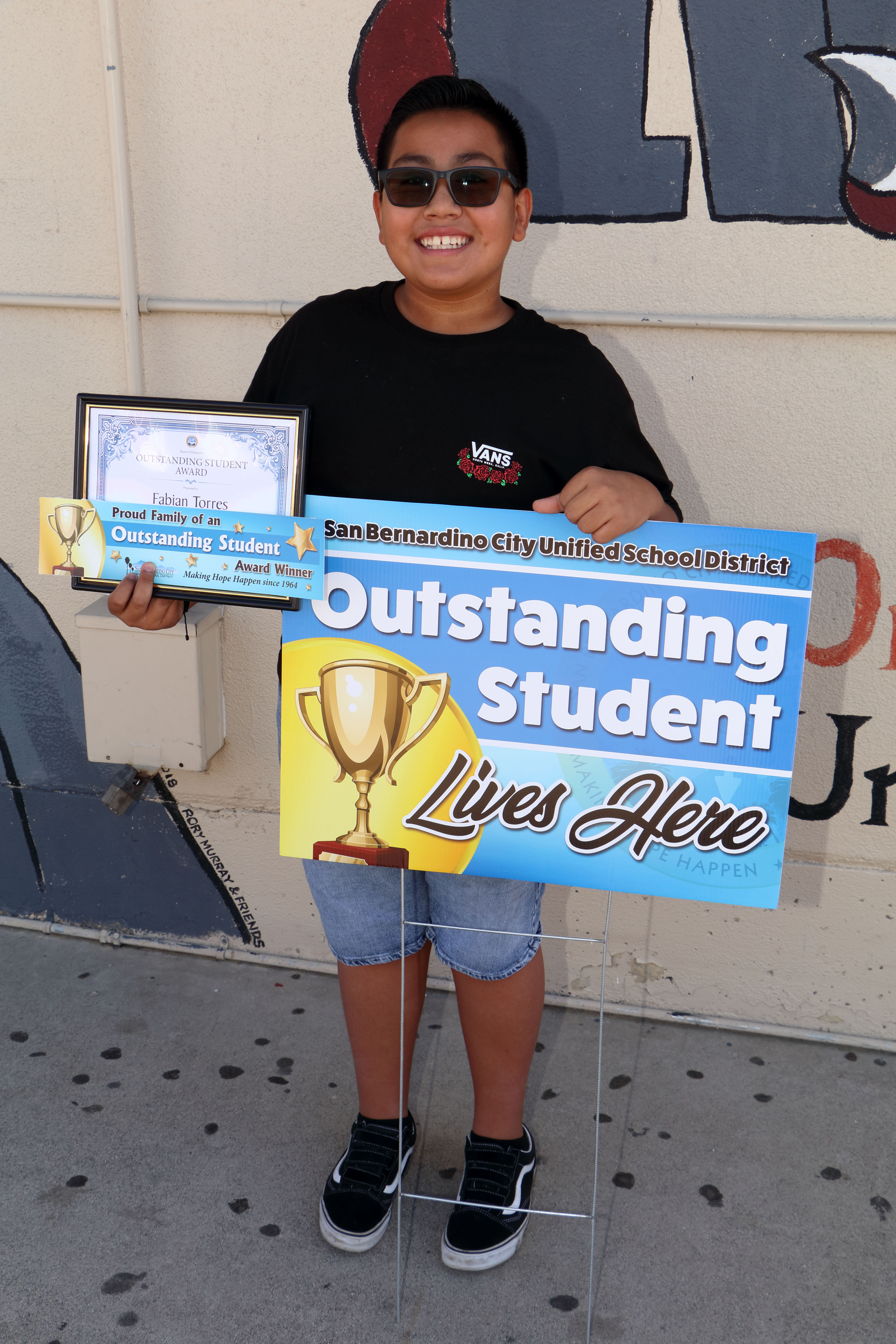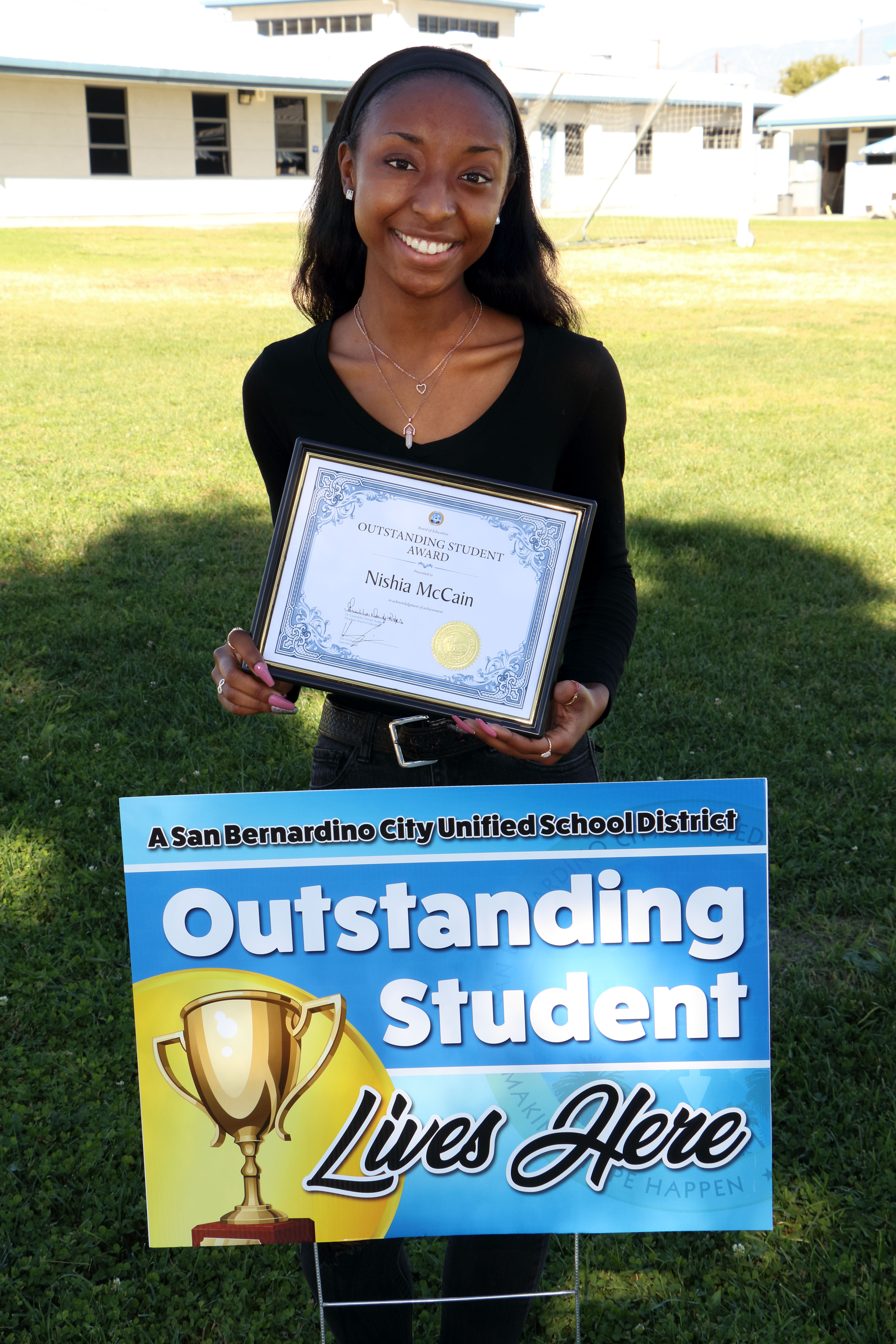SAN BERNARDINO, CA— On November 16, 2021, the Board of Education presented the Outstanding Achievement Awards to students, parents, and staff at Arrowhead Elementary School, King Middle School, and Middle College High School (MCHS).
The Board recognizes Outstanding Student Award winners to build self-esteem and honor excellence in academics, athletics, fine arts, citizenship, and most improvement. The Board also presents the Outstanding Parent/Guardian Award and Outstanding Employee Award to individuals who embody the district’s dedication to student achievement and well-being.
Arrowhead Elementary School, Principal Tina Murray:
Zayden Damu Ralph is a 4th-grader and Outstanding Student. Zayden demonstrates outstanding citizenship and academics at school. He follows directions and completes all of his assignments. He frequently participates in class discussions and is helpful to classmates and staff. Zayden plans to attend college to become an engineer so he can create tall buildings.
Lorenzo Michael Lopez is a 2nd-grader and Outstanding Student. Lorenzo is very conscientious in all he does, which is what makes him a good citizen and a good student. He completes all his assignments, helps his classmates, and is very responsible. Lorenzo wants to become a police officer because they drive cool cars with sirens and help people.

Fabian Torres is one of King Middle School’s Outstanding Students. (Photo by Corina Borsuk and provided courtesy of SBCUSD)
Outstanding Parent Award winner Lorraine Mosqueda is the mother of three Arrowhead students. Her children have great attendance, which shows how much she values education. On the first day of school, Lorraine saw a need and moved to fill it. She’s been a substitute rec. aide ever since. Now, Lorraine constantly looks for ways to support all Arrowhead students.
Educational Assistant III Kadi Francisca Regalado is the Outstanding Classified Employee. She’s a team player and maintains a positive attitude when working with staff, students, and families. Kadi works with students in small groups, assists with supervision, and interprets for parents. All of this helps ensure that the Learning Academy and the entire school are a success.
Outstanding Certificated Employee Cynthia Webb is focused on meeting the needs of all her students. Her classroom is a warm, welcoming environment that promotes fairness and high expectations for all. She sets the example for her students by always seeking ways to improve her skills. The relationships she builds with students and staff make her a trusted teacher and friend everyone can count on.
Dr. Martin Luther King Jr. Middle School, Principal Maria Jauregui:
Fabian Torres is an 8th-grader who demonstrates outstanding academics, citizenship, and leadership. He was elected ASB vice president this school year and is a committed AVID scholar who embodies the Roadrunner ideals of academic achievement, integrity, and perseverance. Fabian has a passion for helping others and wants to become an immigration lawyer.
Omari Hailee Carrington is an 8th-grader and Outstanding Student. Omari is a good citizen, student, and leader. She maintains a 3.6 GPA while also serving as Student Body president and a member of the School Site Council. Omari is also active in sports and in helping her fellow Roadrunners. She wants to attend John Hopkins University to become a cardiothoracic surgeon.
Outstanding Parent Award winner Brandie Foster has been an involved parent at King for more than 10 years. She’s served on the School Site Council, volunteered to support school functions, is an active PTO member, and is willing to pitch in with any task, no matter how big or small. And she does all that while raising three children, Derek, Frederick and Latona.
Outstanding Classified Employee Avelina FierrosVera takes pride in her work as a custodian. Her attention to detail means that everyone in the King family enjoys a clean and pristine campus environment. She arrives early and cleans the front of the school and parking lots so families start the school day with a clean campus. Avelina is the quiet hero of the school.
Science teacher Cesiah Rojo is an Outstanding Certificated Employee. She’s admired by her peers and loved by her scholars, in part because of her positive attitude, her solution-oriented approach to teaching, and her willingness to go above and beyond for her scholars and the school. Cesiah believes in seeing the best in everyone, and she shows us her best every day.
Middle College High School, Principal James Espinoza:

Sophomore Nishia McCain is one of three Outstanding Students from Middle College High School.(Photo by Corina Borsuk and provided courtesy of SBCUSD)
Sophomore Nishia McCain is an Outstanding Student because she is laser focused on both college and career. She’s preparing for her future, with the goal of attending UC Berkeley and majoring in Criminal Justice so she can become a civil rights attorney and eventually a judge. As long as she can remember, Nishia has been interested in fighting for the rights of others.
Senior Diana Vicencio is also an Outstanding Student. Despite the challenges of the pandemic and on her own initiative, Diana founded both a National Honor Society and California Scholarship Federation chapter at MCHS. Diana plans to attend UCLA and earn a bachelor’s in micro-cell biology and a master’s in biology on her way to becoming a hospital pharmacist.
Junior Venus Fernandez is contagiously positive and supportive of others, helping them be successful academically and emotionally. Venus discovered she was interested in the mind and helping children while attending SBVC, and she wants to continue her studies at UCR to become a pediatric psychiatrist.
Judith Garcia is an Outstanding Parent. She’s been an active member of the School Site Council, Coffee with the Principal, and the WASC focus group. But what MCHS appreciates most about Judith is her kindness, humility, and willingness to share ideas for the benefit of not just her child, but all Middle College scholars, parents, and staff.
Joanna Perez is a bilingual office assistant I-health aide and Outstanding Employee. She demonstrates positive passion, teamwork, and a focus on results in whatever she does. No task is too big or too small, and she completes every assignment with excellence in mind. Everyone in our Middle College family values, respects and appreciates Joanna.
Marissa Austin is an AVID supporter of Middle College, and her principal means that in all senses of the word. She’s the AVID site lead and a senior advisor. Her positive passion and relentless dedication to success has helped MCHS achieve a yearly 100 percent A–G completion rate, graduation rate, and college acceptance rate. She also helped us become an AVID Site of Distinction.
 Brotherhood Crusade celebrated its 20th Annual Christmas in the Neighborhood, Saturday, December 11th, at the parking lot of the local Los Angeles Sentinel Newspaper.
Brotherhood Crusade celebrated its 20th Annual Christmas in the Neighborhood, Saturday, December 11th, at the parking lot of the local Los Angeles Sentinel Newspaper. Westside Story Newspaper – Online The News of The Empire – Sharing the Quest for Excellence
Westside Story Newspaper – Online The News of The Empire – Sharing the Quest for Excellence




